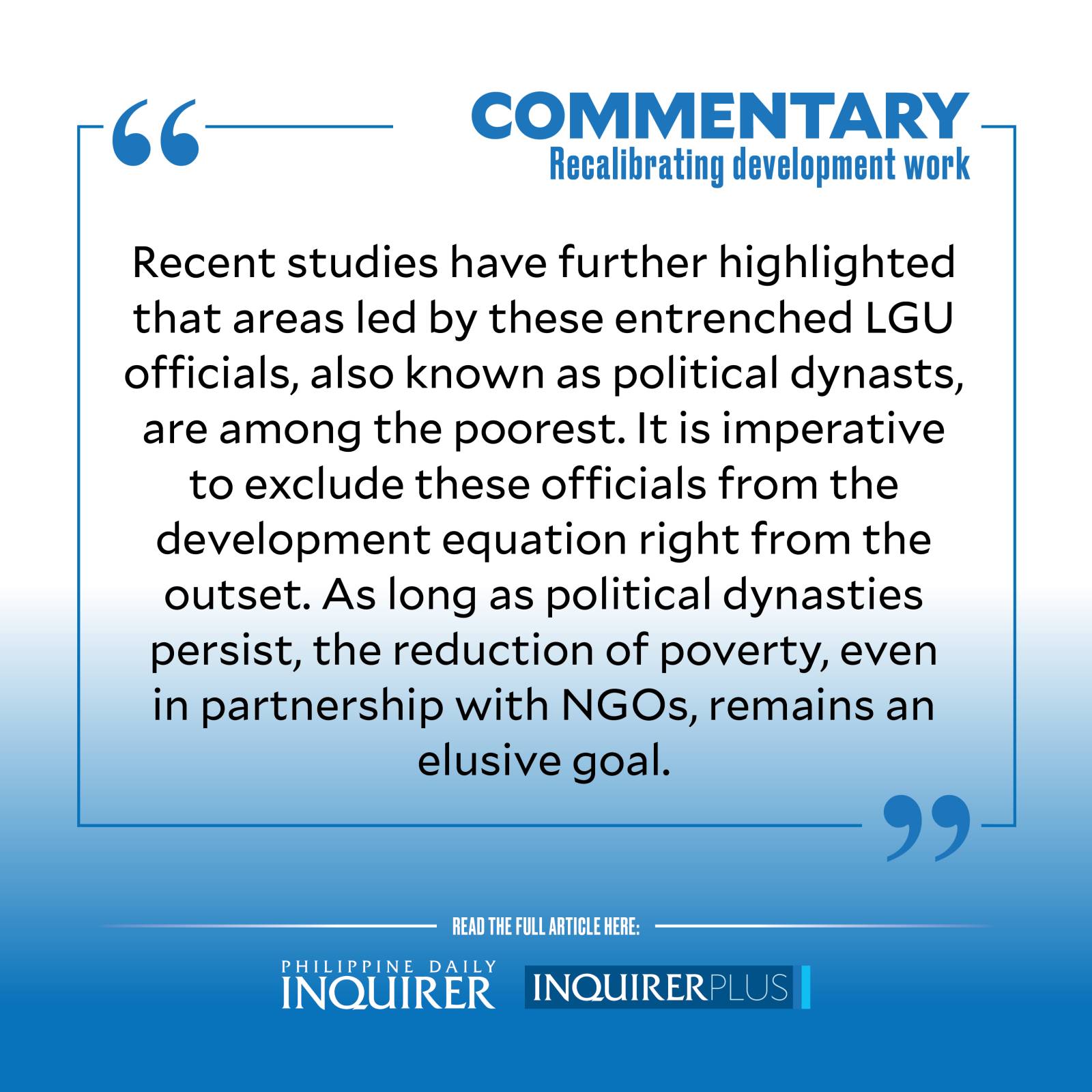Recalibrating development work
What I’m about to share on development work remains relevant based on my experiences in Asian countries. Take, for example, the Philippines. When embarking on a new program area, it is customary to extend a courtesy call on local officials of the province, city, town, or barangay.
But it is disheartening to note that many of these local government unit (LGU) officials belong to economically and politically influential families who have lorded it over their localities for extended periods. Their vested interests usually take precedence over the well-being of their poor constituents. And they are deeply entrenched in political dynasties that have persisted for generations.
Article continues after this advertisementWhile a courtesy call might seem inconsequential, it carries far-reaching implications. In development work, nongovernment organizations (NGOs) solicit the perceptions and sentiments of local officials when it comes to making crucial decisions or taking action. They take extra care to avoid offending these officials to preserve the harmonious relationship forged during the courtesy call. Any threat to their political stranglehold is an elephant in the room. Unfortunately, this can lead to a recalibration of the development agenda.I’ve come to realize that there is a fundamental flaw in protracted engagements with these LGU officials. While they may have a role within the broader framework, their influence needs to be reined in. Despite the countless memoranda of agreement signed over the years, LGUs have made negligible progress. Given this, adopting a more top-down approach that involves working with national government agencies to secure local-level partnerships might be a more viable option. Still, this approach may present challenges, as national and local officials often belonging to political dynasties tolerate and support one another. One could argue that development work in the Philippines is, in fact, a Catch-22 situation.
For a long time, development programs and projects have fallen short of their long-term objectives. And eloquent and attractive terminologies have been used to describe them. Recent studies have further highlighted that areas led by these entrenched LGU officials, also known as political dynasts, are among the poorest. It is imperative to exclude these officials from the development equation right from the outset. As long as political dynasties persist, the reduction of poverty, even in partnership with NGOs, remains an elusive goal.
Engaging with these entrenched politicians is a challenging endeavor, as development work struggles to gather momentum in achieving its desired long-term results. It adheres to the usual routine, starting with enthusiasm, accompanied by photo opportunities, and concluding in a lackluster manner. This pattern persists, despite innumerable workshops and attempts to overhaul the entire landscape of development work. Transforming the approach to engaging with poor communities remains a persistent challenge. Interestingly, the status quo serves the interests of NGOs, while the dilemma of altering it remains. Poverty continues to be a lucrative sector.
Article continues after this advertisementThe Vietnamese experience proves that to reduce extreme poverty, it is essential to start at the grassroots level with the active involvement of the poor themselves. Political dynasties are not as prevalent as in other countries. The period of the Millennium Development Goals (MDGs) saw a reduction by half of Vietnamese families living on less than $1.90 per day in less than 15 years. Presently, Vietnam surpasses the Philippines in almost every economic aspect. It has significantly reduced poverty incidence from double-digit levels in the 1990s (1993, 58.1 percent) to single digits (4.4 percent in 2021), compared to the Philippines (1990, 29.7 percent; 2021, 18.1 percent). This achievement is remarkable, especially considering the country’s history of war decades ago. In China, where development work also started late, nearly 800 million people were lifted out of poverty between 1981 and 2015, which encompassed the MDG era.
One may ponder whether development work is more effective in communist countries. In democracies, local politics casts a long shadow.
—————-
Nono Felix worked for an international NGO as a corporate planning, monitoring, and evaluation manager, covering 13 Asian countries.
















